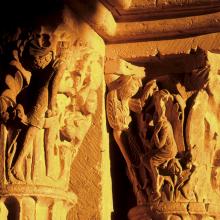France
The number of violent anti-Semitic attacks around the world surged nearly 40 percent last year, according to a report released April 15 by researchers at Tel Aviv University in Israel.
The report found there were 766 recorded incidents against Jewish people in 2014 — the worst year for attacks since 2009. It was released ahead of Israel commemorating Holocaust Remembrance Day, which began April 15 at sundown.
The attacks were “perpetrated with or without weapons and by arson, vandalism, or direct threats against Jewish persons or institutions such as synagogues, community centers, schools, cemeteries, and monuments as well as private property,” the authors of the report, based at the Kantor Center at Tel Aviv University, said.
In 2013, there were 554 registered incidents.
Sunlight slants across a classroom at the Catholic University of Lyon, where the Bible dominates an evening lecture.
The subject may not seem surprising in this ancient city that was once a bastion of French Catholicism and a hub for Christian missionaries. But the dozen or so people jotting notes are not theology students.
One young woman wears a headscarf. A man sports the beard of a devout Muslim. Still others are non-Muslim civil servants working for the local government.
All are enrolled in a program on the French concept of secularism and religious tolerance that is jointly run by two Lyon universities and the city’s Grand Mosque. They’re the unlikely foot soldiers of a national campaign for “Islam a la Francaise.”
The drive has taken on new urgency since January’s terrorist attacks in Paris and the departure of hundreds of French youths to join jihadist movements in the Middle East.
The country’s leftist government has responded with a raft of new measures to fight homegrown extremism.
While a new Congress relentlessly pursued its ideological agenda to trim government and reward its big-money patrons, a vastly more complicated world intruded:
- In Maryland, a bishop reportedly driving drunk struck a bicyclist, fled the scene while he lay dying and, according to some reports, returned only after a church official told her she had to do so.
- In Paris, a handful of religious terrorists defended the Prophet Muhammad by slaughtering the staff of a satirical magazine.
- In Nigeria, the Islamic extremist group Boko Haram intensified its systematic massacring of Nigerian citizens.
- In New York City, police officers wanting more respect from the new mayor waged a childish campaign of disrespect against the mayor and against the people of New York.
- In Washington, the latest jobs report showed more jobs being created but no gains in pay. That means the lower and middle classes continue to be dragged down by up-with-wealth political actions.
All this in a week’s time, all while Congress was pursuing a stale ideological agenda dating back to the 1930s. In that agenda, legislators would gut Social Security (take that, FDR), reward big oil with a new pipeline (thanks for the patronage, Koch brothers), chip away at Affordable Care (gotcha, Barack) and appease social conservatives.
They would treat the world as a simple place where government must shrink, people must suffer and the precious few must get richer.
I love Jon Stewart. I mean, like “maybe jump the fence” love him. His presence on The Daily Show has spoken to and with my generation through some of our most formative years.
And yes, he tells fart jokes (which I also love). And yes, he editorializes, (which is nearly ubiquitous in “legitimate news” streams anyway). But he also often names what people are thinking, feeling, or what they can’t even put into words.
And then he helps us laugh about it, and at ourselves.
On a recent episode of The Daily Show, however, he took a more sober tone when talking about the slaughter in the headquarters of the French satire magazine, Charlie Hebdo. One comment in particular that he made stuck with me, not because it was funny or witty. Rather, it pointed to something we all need to consider more seriously, I think.
 The global movement to implement a small tax on some financial industry trades has gained its first European partner: France. Religious and economic reform groups have been leading the movement to implement versions of what has been called the "Robin Hood Tax" or the "Tobin Tax" since the 1990s. As global markets falter and national economies are brought to their knees by an unregulated financial industry, this financial transaction tax is one small way to impact global reform.
The global movement to implement a small tax on some financial industry trades has gained its first European partner: France. Religious and economic reform groups have been leading the movement to implement versions of what has been called the "Robin Hood Tax" or the "Tobin Tax" since the 1990s. As global markets falter and national economies are brought to their knees by an unregulated financial industry, this financial transaction tax is one small way to impact global reform.
>>On 1 August, France became the first European country to introduce a new financial-transaction tax (FTT) on equity sales and high-frequency trading.
The FTT, often called a ‘Robin Hood tax', is a tax on selected products traded by the financial sector, such as equities, bonds, foreign exchange and their derivatives. Where those countries where such a tax has been introduced (in South Korea, South Africa, India, Hong Kong, the UK and Brazil), the tax may have been tiny (ranging between 0.005% and 0.5%), but it has raised substantial amounts of revenue. The FTT discourages high-risk financial operations and makes the financial sector pay its fair share of taxes. This is sensible: a reckless casino culture in parts of the financial sector caused the financial crisis. It is also fair: our governments bailed out the banks but left taxpayers with debts of trillions.<<
Read more here.
In his successful run for president of France, one of Francois Hollande’s campaign promises was to withdraw all French troops from Afghanistan by the end of this year. Now that he’s taken office, he’s discovering that was easier to promise than it will be to accomplish.
Military specialists are advising him that it is “next to impossible to transport all combat troops and their equipment back to France by the end of the year.” A number of other countries, faced with opposition at home to their war involvement, are also interested in speeding up withdrawals. It should make for interesting discussions at this weekends' NATO Summit.
All across the European continent (and yes, Britain too), proponents of austerity are losing the argument and facing the political consequences. It is a concept that brought many of them to power in the fallout of the debt crisis, has now become “a dirty word”, and one that the ‘resurgent’ European Left continues to disavow.
While we all know that “it’s the economy, stupid,” what effect do these one-issue elections have on the health of our world? What happens when we become so focused on the money in (or not in) our pockets, that other vital issues fall by the wayside?
In their attempts to prove the ‘austerians’ (very different people from the Austrians) wrong, have those who see stimulus of the economy as the path to prosperity inadvertently lost sight of what is really important to the societies that they govern? Is there a risk that economic growth becomes an end goal, rather than a means to something greater – true human prosperity and investment in human capital?
Albert Camus once said that your life is “the slow trek to recover the two or three simple images in whose presence [your] heart first moved.”
Sebastian Moore recovered one of those images after he had wandered into church at vespers on the Feast of the Sacred Heart.
In his book, The Inner Loneliness, Moore describes that moment of awakening. It came one evening after lots of pasta, a lot of spaghetti, and a lot of wine. “As I entered the church, I heard the familiar words [in Latin] ‘One of the soldiers opened his side with a spear, and immediately there came forth blood and water.’ And I had what can only describe as a sense of fullness of truth. Somehow, everything that was to be said about life and its renewing was in those words. Somehow my life, my destiny, was in those words.”
The image that moved his heart became one to which he returns daily, as do I. For the piercing of the side of the helpless man hanging on the cross happened not just then and there at Golgotha; it happens here and there and everywhere when we torture our own souls or the souls of others because we, or they, have failed to measure up to what we expected. Strangely, it is in the piercing that brings blood that we are cleansed by the living water that pours from his side.
Do you see your life in the words and in the image of the spearing of his side, in the blood, but also the water that heals, restores and renews, flowing from his pierced side?
A second image came to me this week on a photography blog of religious architecture by Dennis Aubrey.
Days after a lone gunman murdered a rabbi and three children at a Jewish school in Toulouse, France, a new study reports widespread anti-Semitism in France and across Europe.
The survey, completed in January and released Tuesday by the New York-based Anti-Defamation League, finds that 24 percent of the French population holds anti-Semitic views, up from 20 percent in 2009.
When asked if violence against Jews is rooted in anti-Jewish or anti-Israel sentiment, four in 10 Europeans (39 percent) responded that it was the result of anti-Jewish sentiment.
In France, 45 percent of those asked held this view, up from 39 percent in the previous survey.

With the opening of the G20 Summit in Cannes, France today, an idea that's been around for awhile is in the news again and gaining more attention as a result of the #OWS movement: The so-called "Robin Hood tax," a minimal tax on all financial transactions with the resulting revenue dedicated to anti-poverty programs....Archbishop of Canterbury Rowan Williams, in his response to the occupation of St. Paul's Cathedral in London, endorsed the Vatican proposals. Williams observed that "people are frustrated beyond measure at what they see as the disastrous effects of global capitalism," and urged a full debate on "a Financial Transaction Tax






